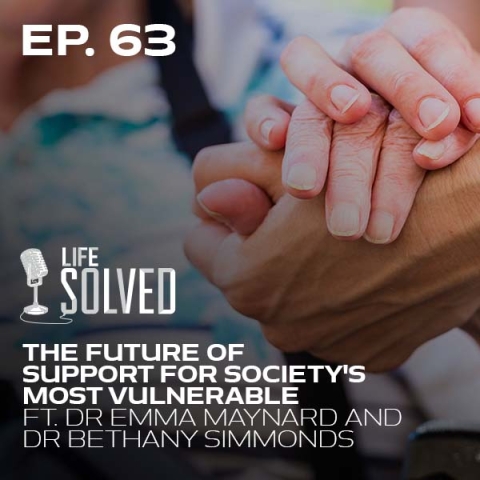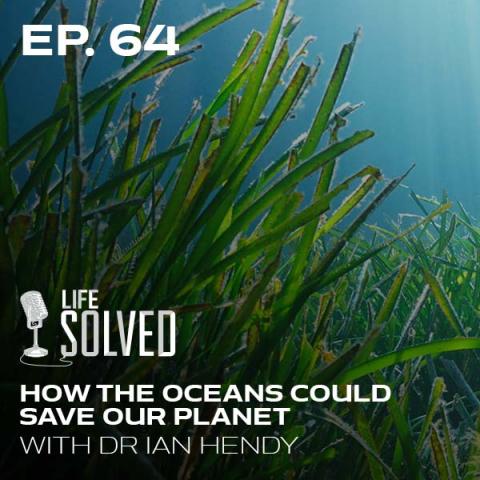

Can schools cope under the strain of increased social need? And where are the UK’s health and care systems failing the most vulnerable in society?
27 min listen
The Future Of Care And Social Support ft Dr Emma Maynard and Dr Bethany Simmonds
Amidst funding restructures, privatisation and the Covid-19 pandemic, the UK’s public services are increasingly undergoing change. From care home homes and emergency services to hospitals and schools, the pressures on the people delivering this care is ever-present.
So what does the future hold for social care and the family support services provided by schools? How will this impact the most vulnerable in society? And what can be done to prevent crises in our social services deepening?
The University of Portsmouth’s Life Solved podcast returns with a new series this April. In the first episode, Dr Bethany Simmonds and Dr Emma Maynard share their insights and perspectives on two vital areas of social support in the UK.
Bethany’s social theory approach to studying clinical decision-making, end of life care and experiences of the ageing population has given her a unique insight into the systemic issues of many care services today. She says that the pandemic has highlighted weaknesses in the healthcare systems of different countries and that poorly structure or opaque systems are putting people at risk here in the UK:
There was just consensus over the number of duplicated services. It is a really a system that doesn’t work for the most vulnerable. Particularly for older people without someone navigating the system for them. It’s devastating – it can mean the difference between life and death
Dr Bethany Simmonds, Senior Lecturer in Sociology
In the podcast Bethany explains her surprising findings when contrasting healthcare systems with different kinds of welfare state. She looked at how waves of Neo Liberalisation in the Global North have played out national policy and discovered that even socially democratic welfare states were relying on outsourced provision of care.
Bethany’s research highlighted that insurance-based systems such as the one in Germany had fewer failings for some of the most vulnerable in society during the pandemic.
Death rates for older people during the pandemic in Germany were a lot less than in the UK and Sweden
Dr Bethany Simmonds, Senior Lecturer in Sociology
Emma Maynard is a Senior Lecturer in Child and Family Studies and her research has been looking at how primary and secondary schools are able to respond to the social and healthcare needs of families. Here too the pandemic has highlighted and exacerbated a system under strain:
I think we are just seeing an unfolding set of more and more complex issues and more mental health needs in schools, which teachers are expected to be able to deal with despite that not being their professional training.
Dr Emma Maynard, Senior Lecturer in the School of Education, Languages and Linguistics
The joint issues created by increased demand for social support and an increase in reporting and monitoring means that teaching staff have been struggling to cope. Emma celebrates the work of schools to support children and families but says that in the face of funding cuts the UK faces more and more people leaving the profession, unable to cope with the increased load on this area of public service.
Whereas both Emma and Bethany agree that supporting workers delivering care with more funding, training and resources is key, Bethany adds that systemic restructures could hold the key to solving our problems. She shares examples of care and support schemes offered in other countries and suggests diversifying this with different kinds of independent charity sector organisations.
You can listen to the full podcast and hear the interviews with Emma and Bethany from Tuesday 26 April 2022.
Search for “Life Solved” from the University of Portsmouth on your podcast app of choice, and why not share this story with a friend who might be interested.
Episode Transcript
Narrator: Welcome to a new series of Life Solved from the University of Portsmouth. In this podcast we’re exploring how research taking place here is changing how we live in and think about our world. As our world moves at pace, the governments, institutions and organisations that serve us rely upon up-to-date research to help make decisions. That’s why in this series we’ll be looking even more closely at how Portsmouth research is playing into current national and world events. We start today by looking at the state of health and social care here in the UK. How is care and decision-making faring in the face of funding changes and private schemes? How does this measure up to what’s happening in other nations, and crucially, what can be done to improve health and social care for everyone in the UK?
Bethany Simmonds: We should be moving away from these large scale organisations that are sort of unaccountable, paying very low wages to staff. The quality of care is very low.
Emma Maynard: We know that all the social needs have increased dramatically during COVID and schools will be dealing with that day in, day out.
Narrator: Meet Dr Bethany Simmonds, a Senior Lecturer in Sociology here at the University of Portsmouth. Her interest in health, wellbeing and care in later life started in 2007 with her PhD. She’s studied end of life care and clinical decision-making as well as paramedic care for older people after falls.
Bethany Simmonds: When I moved to Portsmouth, I decided to write it up in a more sociological way, using social theory and thinking about them as case studies as to why the health and social care system wasn't working for older people, rather than looking at individual clinicians' decision making or low level interventions. I was thinking about what can we do in relation to this system actually not working as a whole? We need to think about the ways in which we value or don't value older people in our society, and I think this isn't just about the pand
Previous episode
Next episode
Discover more episodes
How Ocean Environments Could Save the Planet
Dr Ian Hendy shares some insights into the incredible capacity these natural ecosystems hold in the fight against climate change
3 May 2022
32 min listen

